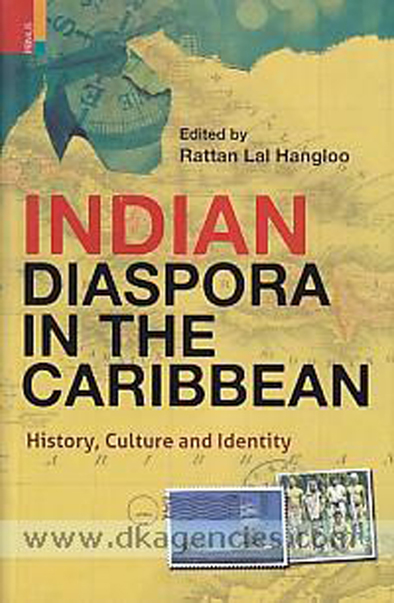Author: Rattan Lal Hangloo
Indian Diaspora in the Caribbean: History, Culture and Identity (Primus Delhi 2012 pages 175 price Rs 795-00)
Published by one of the leading international publishing houses and released by Dr. Karan Singh -the most eminent Indian politician and philosopher (on 4th October 2012 in New Delhi) the book Indian Diaspora in the Caribbean: History, Culture and Identity by the leading social scientist, Profesor Rattan Lal Hangloo, is much more than a usual book of history that serves as a great inspiration and support for scholars to take up this new theme for reconstruction of Indian History and culture. This book seeks to explore some aspects of the history of Indian emigration to the Caribbean, which is one of the most significant events in the history of Indian indentured migration that took place to different parts of the world during the second half of the nineteenth century. The Indians faced many hardships in the Caribbean during the initial stage of their migration. However, over the years, despite several adversities, they have become one of the most successful immigrant ethnic groups in the Caribbean. Their success in the fields of business, politics, culture and education has allowed them to retain their ‘Indian’ cultural identity, strengthening their linkages with the homeland, i.e. India, as well as the Indian diaspora across the world.
Professor R.L.Hangloo is a renowned academician of international repute who has always added purpose and beauty to everything he touches. By initiating this volume too he has pointed to both the Indian scholars and policy makers the importance of Indian Diaspora in handling the useful space for strengthening the India’s cultural diplomacy abroad. Although the Indian diaspora is emerging as a new subject for scholars to study, Professor Hangloo meticulously cautions that this phenomenon should not be lumped together but appropriately characterized in terms of time, space and regional specificities and dynamics. While doing so Professor R.L.Hangloo brilliantly lays the foundation of a new area of study that would be of great significance and consequence in future for India’s diplomacy abroad.
The Indian Diaspora in Caribbean: History, Culture and Identity studies through various contributors the key facets of the retention of the Indian ethos. The analysis of religio-cultural transformation, identity reconstruction, political participation and transformations, as well as resistance to enslavement and other oppressions are really facinating. The volume also examines the mobility and contribution of women and attempts to provide significant insights into the lives of Indians in the Caribbean. The volume is of significant interest to historians, sociologists, anthropologists, policy makers, diplomats and political scientists researching the Indian diaspora-the subject that has not received the attention it deserves.
Having stemmed from the ugly policies and ambitious designs of British colonialism, Indians in the Caribbean have shared the suffering in a variety of ways since the beginning of their arrival on the islands. The first generation was not only the victim of poverty and inhuman treatment meted out to them at every level but also of getting uprooted from their soil in the most devastating manner that has ever been witnessed in the history of the Indian diaspora. However, since the middle of twentieth century, Indo-Caribbean’s have come to play a much more active role in the mainstream cultural, commercial, and political life of their adopted home land that has so magnificently treated in this book.
The book also seeks to demonstrate that the Ramayana has always been an intrinsic aspect of the life of Trinidadian Hindus and has functioned as both agent and mirror of developments and transformation. Hinduism has become central to the literary, cultural and religious heritage of Indian diaspora in the Caribbean. The Hindu immigrants carried a slice of their society and hence religion with them, the uprooting from the Indian context necessitated attempts at community and religious reconstruction. In Trinidad, elements of religion were variously truncated, modified, diluted, intensified or excised. This subsequently yielded a form of Hinduism in which some of the more visible and tangible elements were markedly modified. At the same time, however, the Hinduism which emerged was unarguably rooted in the broad philosophy and general tenets of many of the strands of Hinduism practiced in India.
The book critically examines the economic and political crisis that the Caribbean society faced during the years of British imperialism (from the period of indenture to the period of independence) and how this has been overcome by the efforts of one of the charismatic leaders of the Caribbean’s, Dr Eric Williams. The volume looks at the trials and tribulations of East Indian female indentured labourers in the Caribbean. After presenting a brief historical overview of the indenture ship experience the book also tries to focus on the experience of East Indian women during the period of indenture ship. The volume discusses the narratives of economic and labour activities of ex-plantation workers, specifically Indian women in Trinidad, and the role of these women in the economic diversification and development of the island. The credit goes to Professor R.L.Hangloo for picking up this subject and for organizing this whole exercise with the assistance of contributors and presenting so wonderfully vibrant account through which Indian diaspora comes alive.
Professor Rattan Lal Hangloo very rightly says, “Indian Diaspora is not only a memory of the past beyond recall but a constant abiding of living spirit”.
(The reviewer is an Assistant Professor Central University of Mizoram)


